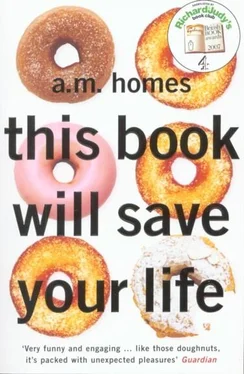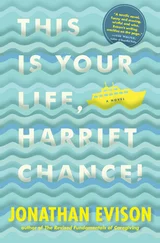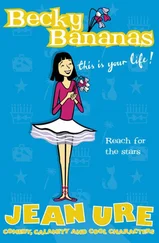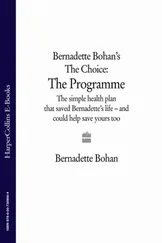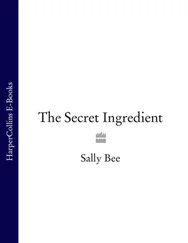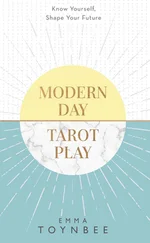He can take a long weekend and go visit his brother in Boston. "Sold," he says. "Now tell me, whose is it?"
"You don't want to know."
"Yes, I do."
"Let's just say, you'd recognize the name; 'nuff said."
"I'm going to be living in some guy's house and I don't even get to know who it is?"
"You're not living in his house, you're living in a house he owns — it's very different. He's never spent a night here."
DRIVING BACK into town, he is dizzy with the vibrancy of life — or maybe it's his new diet or lack of a diet. He is about to pass out. A donut — that would fix him for the moment; he brought a few along, thinking he'd give them to Billy, but when he saw Billy thought, No donut.
He reaches into the bag, bites into one; raspberry jelly explodes onto his face. Using his tongue, his fingers, he attempts to lick himself clean while at the wheel, like an animal grooming, licking until he is not sticky anymore.
"ALWAYS HAPPY to see you," Lusardi's receptionist says when he steps into the office.
Richard hands her his parking ticket.
"My kind of man — validate in advance, that way you don't forget. How is the pain?"
"I don't know. I've been busy, got hit by a car, my house is about to fall into a sinkhole, and you know that horse they evacuated — I helped."
"So — it's a bit better?"
He pauses. "Not really; I think that's why I called."
Lusardi acts as though he's never seen him before — no hi, hello, good to see you again. "What brings you in?"
"The same," Richard says.
"Let's take a listen."
Richard takes off his shirt. "I don't know anything anymore. Is that normal? Is it normal to notice the enormity of everything and just go blank?" His shirt is off; he's covered in goose bumps. As Lusardi is listening to his heart, he's trying to remember how he ended up in L.A. He was still living with his wife when the company said they might need someone on the West Coast. Richard asked her if she thought he should go, and she said it was late and she didn't care, just as long as she could get some work done before she went to sleep.
He remembers her not having an opinion — was that a neutral or a negative? He remembers feeling like he had become invisible. He moved out two weeks later.
Lusardi is looking into his eyes with the light. Richard is thinking of how angry he was, and obviously still is, at his wife for letting him go so easily — and at himself for leaving without a fight.
"I dreamed I was falling in a black hole," he tells Lusardi.
"You know what happens in a black hole," Lusardi says as he's flipping through the chart. "You're pulled from both ends until finally you rip apart. How are your eating habits, good? Stick out your tongue."
Lusardi looks at his tongue. "Did you eat a jelly donut?"
"Yes, how do you know?"
"Your breath is sugary, your tongue is coated, and you've got some on your shirt."
"My diet has been way off. Usually it's good, but the last couple of days…"
Lusardi opens the chart again and flips through the pages. "We got your labs back, your PSA — prostate-specific antigen — was a little high. Minimally, I should do a rectal to see if I can feel anything."
Richard drops his pants. Lusardi slips on a glove and wiggles his finger up Richard's ass. "When men get prostate cancer at your age, it's usually worse than when they get it later. We all die with prostate cancer, did you know that? Strange but true. It's usually not the thing that kills us, but it's there. Do you ejaculate often? Are you sexually active?" he asks with his finger still up Richard's ass.
"Not much." Richard says.
"Try and ejaculate more often; there's some mythology out there that, the more you do, the less cancer you get, it keeps everything moving. I can't say there's any proof, but why not." He pulls his finger out. "I didn't feel anything. Do you have trouble getting an erection?"
"No, I don't have much trouble."
"Much trouble meaning occasional trouble? I could give you some Viagra."
"Much, meaning I haven't been in a situation where I would know. I have no feelings except the pain, which is why I am here. I'm dead — dead men don't ejaculate."
"Well, you wouldn't be in pain if you were a dead man. So perhaps the pain is a good sign in this case? In terms of the prostate, we can pursue it, or wait and repeat the test in six months." He smears his shitty finger on a cardboard colon-cancer card and then snaps the glove off, as though it's all in a day's work. "Is it still raining out? It was when I came in."
"No… not really."
"How much does it hurt?"
Richard shrugs.
"Pain management — that's what addicts do. We could just hook you up to a morphine pump and you could play the mother in Long Day's Journey."
Richard says nothing.
"It's delicate — this process of waking up, coming in from the cold — you can't do it overnight."
"Why not?"
"You'd die." Lusardi sits at his desk. "You don't know how to feel — or, more accurately, what to do with what you feel. When a person comes in from the cold, it's not like they immediately feel warm. If they've been out for a while, they come in and everything hurts, and the warmer they get the more pain they're in. It's excruciatingly painful. For, as much as you want to feel nothing, you feel everything, you feel too much to bear, like you'd explode, or go crazy, if you knew how much you felt."
"I'm numb," Richard says, flatly.
"You have some sensation."
"Yes, something like an insect bite, an itch or irritation, like poison ivy that won't quit. The other day, after all this happened, I called my ex-wife, my son, my parents, my brother. I talked to everyone, and I felt worse."
"Who were you growing up — back of the class, athlete, goody-goody?"
"I blended — unremarkable, neither here nor there."
Richard is on the table with his shirt off, his pants down, feeling more than naked — small, nervous. And there's Lusardi, tapping his fingers on a prescription pad.
"Did you ever have anxiety attacks before — would you like to have something for them?"
"Is that what this is — anxiety?"
"To some degree, sure. You're mortal, you've failed, you're not the person you wanted to become, your mother doesn't love you, your father doesn't know who you are, everyone has it better than you."
"It's not like I'm a loser. I did something. I made money. I made enough money to make a lot of people happy. In fact, I've probably made more money than my brother."
Lusardi feigns shock in an exaggerated way. "And now that you've done that — what? It sounds like you finished that part of things a while ago."
"I'm uncomfortable," Richard confesses, putting his shirt back on.
"Climb a wall."
"What?"
"You have hit a wall, now climb it — literally." Lusardi opens his Palm Pilot, looks something up, and writes down a couple of phone numbers. "They'll teach you."
"Very funny."
"I'm a hundred percent serious. Make the mental physical, and the physical mental, and things will improve. I can't make you feel better. It's not within my power."
"If I were your relative, what would you tell me?"
"I would tell you that you need to do something — I would tell you to try everything. You need to be brought back to life. Don't even wait until tomorrow, begin again right now, begin again every moment. Do you believe in anything?"
"I don't know," Richard says.
"Do you pray?" Lusardi asks, and Richard says nothing. "Think about it." Lusardi hands him the piece of paper with the numbers of rock-climbing schools and leaves the room.
The sadness Richard feels is so deep, so whole, it is as though he himself is sadness — that's what he held on to, that's what he kept for himself. He feels his failings, each like a claw digging in. He feels the limits of his personality, of his fear, of his ability to know himself, to know what he already knows.
Читать дальше
